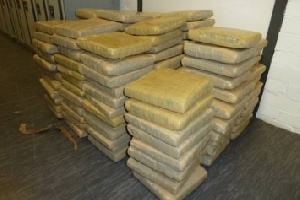There seems to be more than what Ghanaians have been told about the strange and bizarre circumstance under which a haul of cannabis (wee), weighing 1.5 tonnes with an estimated street value of £4.3 million ($8.6million), left the Kotoka International Airport in Accra to the Heathrow Airport in London in the United Kingdom.
A Closed Circuit Television (CCTV) camera captured the in and out movements of operatives at the Aviance cargo village at the airport leading to the flying of the drugs to Heathrow without passing through the scanner.
A copy of the video has been watched and analysed by DAILY GUIDE,with a strong indication that contrary to suggestions that the scanner was faulty, there was nothing wrong with it.
The wee, concealed in fresh fruits and vegetables, left Ghana unnoticed until it was arrested by UK Border security agents.
The seizure has put the spotlight on Ghana in what appears to be a losing battle against the drug war.
DAILY GUIDE investigations have uncovered the activities and operations of the drug cartel, which allegedly used Kwaoso Enterprise, the company behind the export of the drug, concealed in fruits from Ghana to the UK, at the Aviance Cargo village where it all started.
Investigations have also revealed that the drugs were being sent to a consignee in the UK with the address Kwaoso Enterprise, c/o Saint Mark Freight Services, 132 Inner Street, Enfield, UK.
The operation was carried out in the early hours of Monday September 24, between 4:30am and 5:05am.
It involved agents of the cargo airline (Virgin Atlantic) with flight number VS658 which carried the ‘wee’ to London.
It also included men who were supposed to be providing security services at the airport such as Customs officials, the Aviation Security and agents of Air Ghana, a company contracted by the airline to handle its cargo at the airport.
All these were captured on a Closed Circuit Television (CCTV) installed at the place by the company in charge of the scanner at the airport, Nick TC-Scan Limited, an affiliate of Ghana Link Network Services Limited.
DAILY GUIDE has managed to watch the recordings of the video footage which exposed the rot at the cargo village.
The footage shows how the various actors deliberately played along what looked like a well choreographed plan.
Minutes after the goods containing the neatly wrapped drugs arrived at the ‘cargo village’ around 4:00am, agents of Aviation Profile and Security Services (APSS) started processing them.
APSS is the company contracted by Air Ghana to handle the Cargo of Virgin Atlantic airline.
The Operation
Interestingly, it was only the driver who sat on the vehicle though a security man was supposed to be with him.
The standard procedure, according to sources, was for a security man to accompany a vehicle that conveys all goods for export to the scanner with documents covering the cargo in hand.
But this time around, after the preparation of the documents, two of the goods by-passed the scanner on a truck to a security check point a few meters away from the scanner round 4:30am on Monday September 24, without a security man inspecting it.
Minutes later, the driver was seen detaching the load from the truck and went for another two of the same kind, making four.
He then went in for the remaining two and offloaded one onto the conveyor belt of the scanner with the other one still on the truck.
The driver appeared restless and was seen perambulating as though something was haunting him.
After the container he sent for screening was approved as normal, the driver went round the scanner to carry the scanned one back onto the truck, an indication that at no point was the scanner not working at the time the marijuana was sent to the ‘cargo village’ for processing and inspection.
He then parked the truck in front of the scanner and went into the Customs office where an officer on duty approved the document and dispatched the goods to proceed to the security check point.
Even before the truck approached the check point, the gate was widely opened with the security man allowing all the six loads, including the un-scanned ones to pass through without checking.
The obviously confused customs officer who was on duty forgot to put off the light in the office and had to return to put it off before setting off for home after the deal.
Security Ploy
The same is believed to have happened at the last security check point before the tarmac, since, according to a source, assuming without admitting that the scanner was not functioning, the security men at the various posts, including the Customs officer should have detected the anomaly since only one of the loads was scanned and same was approved on the document.
“When the scanner breaks down for even maintenance for a few minutes, we tell the Customs officials to take over; so now the physical inspection will be more vigorous,” the source told DAILY GUIDE.
According to the source, this was done “because our people have not been trained to do physical examination. Apart from that we are not mandated to do any physical examination; Customs has the mandate; so as soon as the machines break down, Customs back the system up.”
DAILY GUIDE sources at the Aviance cargo village hinted that a day before the incident, speculation became rife that the scanner had developed a technical fault when indeed it was functioning, ostensibly to prepare people’s minds in case the deal was uncovered.
By international convention, only diplomatic goods are not allowed to go through the scanner, but even those are occasionally scanned and searched when any of the security agencies at the airport including the National Security, officials of the NACOB, Customs and Aviation Security, raise issues with the content or suspect they contain contraband goods.
Some have suggested that the leverage provided by this international treaty in a way, contributes to the incidents of illicit drug trade since it provides an escape route for certain diplomats to engage in the ‘business.’
Decoy
Documents covering the five un-scanned cargos which contained the illicit drugs were uncovered on Tuesday September 25, when officials of the Narcotics Control Board (NACOB) stormed the place in a bid to probe what might have gone wrong.
Apparently, a worker with Nick TC-Scan, called Monica, had kept a dossier of all documents covering un-scanned goods.
It was then that it emerged that only one among the six goods in question went through the scanner and that documents covering the said goods were marked as normal, whilst those covering the other five which contained the cannabis had been marked ‘scanner faulty’ by the agents with the date as September 25, 2012, which was a Tuesday, when the flight indeed left on Monday September 24.
A ground agent of APSS whose name was given as Charles was captured by the CCTV as the one who went to dump the five other documents at the offices of Nick TC-Scan Limited to make it seem as though it was the negligence of the scanning company that resulted in goods getting to Heathrow.
Apart from that the security agencies have also been able to uncover that Monica who was off-duty, received a call from an agent of the airline on the morning of Tuesday September 25, asking her whether she was at post and if she could talk to some of the analysts to fidget with the scanner to make it look like the cargo containing the drugs were scanned because his people were in trouble.
She was said to have responded in the negative.
The said gentleman whose name is not yet known is said to have been picked up by the security agencies.
So far five officials of NACOB, namely Kamaldeen Awudu, Worlanyo Fiano, Ibrahim Badoo, Marvin Amon-Kotei and Ben Kusi Asante have been arrested and released on bail over the busted wee.
A supervisor at Aviance has also been picked up for interrogation.
Bemused Executive Secretary of NACOB, Yaw Akrasi Sarpong, also called ‘Crazy Sarpong,’ put up a façade, contemplating whether or not to resign over the image-denting narcotic heist.
But National Security Coordinator Lt. Col. Larry Gbevlo-Lartey (rtd) insists the man would not resign.
Gbevlo himself has visited the place.













